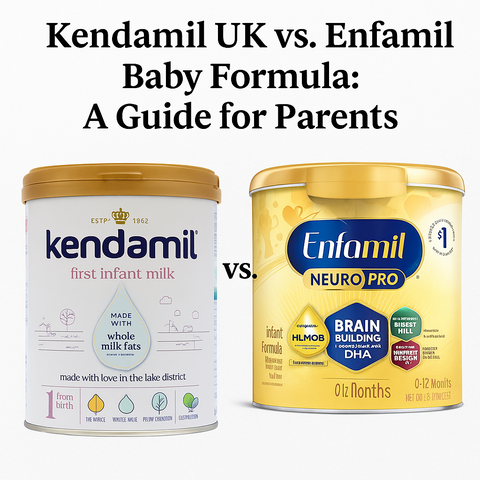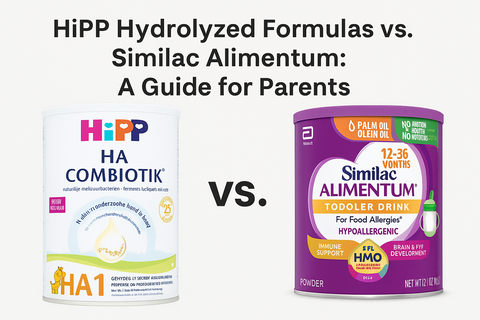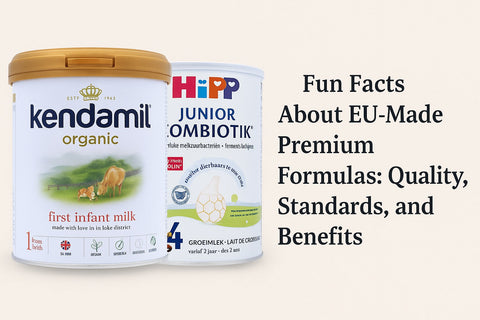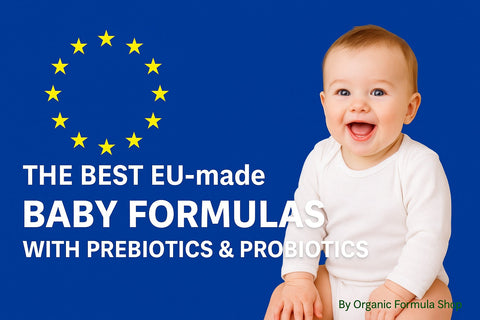HiPP Infant Formula vs. Enfamil: A Guide for Parents
Selecting the ideal infant formula is a big decision for parents, and with so many options, it can feel daunting. Two standout brands, HiPP Infant Formula (made for the European market) and Enfamil (a trusted US name), are renowned for their quality and nutritional focus. While both are excellent, they differ in ingredients, regulatory standards, and formulations. This guide compares HiPP and Enfamil, highlighting key differences like stricter European Food Safety Authority (EFSA) regulations, organic certifications, iron levels, and the impact of Operation Stork Speed. We’ll help you choose the best formula for your baby’s needs.
Why Compare HiPP and Enfamil?
HiPP and Enfamil are leading names in the infant formula market, each offering unique benefits worth comparing, especially for parents exploring HiPP Formula USA options.

HiPP, a German family-run brand founded over a century ago, is a pioneer in organic baby food and formula. Known for its commitment to sustainability and organic farming, HiPP uses high-quality, organic ingredients free from GMOs, synthetic pesticides, and antibiotics. Popular products like HiPP Combiotic Dutch Formula, HiPP Combiotic German Formula, and HiPP Goat Formula adhere to strict EFSA standards, offering tailored nutrition for various developmental stages. For US parents seeking HiPP US, these formulas are available through trusted online retailers.

Enfamil, produced by Mead Johnson Nutrition (a Reckitt subsidiary) since 1905, is a leader in US infant formulas. With a focus on meeting diverse nutritional needs, Enfamil offers specialized options like NeuroPro, Gentlease, and Sensitive, adhering to U.S. Food and Drug Administration (FDA) standards. Widely available, Enfamil is a popular formula for American parents seeking nutrition.
While both brands prioritize infant health, HiPP’s organic, EFSA-regulated formulas contrast Enfamil’s FDA-compliant, versatile range. Initiatives like Operation Stork Speed highlight gaps in US formula safety, making this comparison essential for parents.
Similarities Between HiPP and Enfamil
HiPP and Enfamil share several features that make them popular among parents, reflecting their dedication to infant nutrition, whether you’re considering HiPP Formula USA or Enfamil:
- High-Quality Ingredients: Both use carefully selected ingredients to support growth. HiPP sources organic skimmed milk, while Enfamil uses nonfat milk and whey protein for balanced nutrition.
- Specialized Formula Options: HiPP offers HiPP Comfort Formula for digestive issues and HiPP HA Formula for allergies. Enfamil provides Gentlease, Sensitive, and AR for fussiness, lactose sensitivity, and spit-up.
- Prebiotics: Both include prebiotics (GOS and FOS in HiPP, FOS in some Enfamil formulas) to promote gut health.
- DHA and ARA: Both incorporate DHA and ARA for brain and eye development, sourced from organic oils (HiPP) or synthetic sources (Enfamil).
- Essential Vitamins and Minerals: Both are fortified with vital nutrients for healthy development.
- Eco-Friendly Packaging: Both use recyclable cans to maintain formula freshness and reduce waste.
Key Differences Between HiPP and Enfamil
While both brands excel in infant nutrition, their differences arise from regulatory standards, ingredients, formulation stages, and initiatives like Operation Stork Speed. Let’s dive into these distinctions to help you choose the best formula.
1. Regulatory Standards: EFSA vs. FDA
The primary difference lies in the regulatory frameworks governing their production:
-
HiPP (EFSA Standards): Formulas like HiPP Combiotic Dutch Formula and HiPP Goat Formula are produced under EFSA and EU organic regulations, requiring:
- No synthetic pesticides, fertilizers, or GMOs.
- Strict limits on contaminants and additives.
- Comprehensive safety and nutritional testing.
- Holistic animal welfare, including outdoor grazing.
-
Enfamil (FDA Standards): Enfamil adheres to FDA and USDA standards, which are rigorous but less strict than EFSA’s. For example:
- FDA allows specific synthetic nutrients and additives banned in the EU.
- Organic certifications permit limited pasture access and potential pesticide overspray.
- Testing is thorough but less extensive than EU protocols.
Key Takeaway: EFSA’s stricter standards ensure HiPP’s superior purity and nutritional precision, creating a quality gap unlikely to close without significant FDA reform.
2. Organic Certification: European vs. American
Organic standards differ significantly between the EU and US, impacting formula quality:
- HiPP (European Organic): HiPP’s formulas, such as HiPP Combiotic German Formula, meet stringent EU Organic standards, banning synthetic hormones, antibiotics, and cross-contamination. Farms prioritize soil health and animal welfare, ensuring pure ingredients.
- Enfamil (American Organic): Enfamil lacks organic certification, though some formulas use non-GMO ingredients. USDA organic standards allow flexibility in pasture access and potential trace GMOs from manufacturing, making them less rigorous than EU standards.
Why It Matters: HiPP’s organic certification appeals to parents seeking the highest purity, while Enfamil suits those prioritizing accessibility.
3. Operation Stork Speed: Addressing US Formula Safety
Launched on March 18, 2025, by Health and Human Services Secretary Robert F. Kennedy Jr. under the Trump administration, Operation Stork Speed aims to improve the safety, nutritional quality, and availability of US infant formulas. Sparked by the 2022 formula shortage and concerns about contaminants like arsenic and lead, it includes a nutrient review (the first since 1998!), increased heavy metal testing, and clearer labeling. This initiative highlights gaps in FDA oversight compared to EFSA’s stricter protocols, giving HiPP an edge in purity and safety.
4. Ingredients: Probiotics, Carbohydrates, and Oils
HiPP and Enfamil differ in their ingredient profiles:
-
Probiotics and Prebiotics:
- HiPP: Includes prebiotics (GOS, FOS) and probiotics (Lactobacillus fermentum, Bifidobacterium infantis) in formulas like HiPP Comfort Formula to support gut health.
-
Enfamil: Includes prebiotics (FOS) in some formulas but lacks probiotics, offering less digestive support.
-
Carbohydrates:
- HiPP: Uses organic lactose as the primary carbohydrate, mimicking breast milk for gentle digestion. Some formulas include starch or maltodextrin for thickness.
- Enfamil: Uses lactose in some formulas (e.g., NeuroPro) but includes corn syrup solids in others (e.g., Gentlease), which may cause blood sugar fluctuations.
-
Vegetable Oils:
- HiPP: Uses organic palm, sunflower, and rapeseed oils in HiPP Dutch Goat Formula, sourced sustainably.
- Enfamil: Includes palm olein, soy, coconut, and high oleic sunflower oils, with palm oil potentially linked to digestive issues.
5. Iron Levels: A Critical Consideration for Newborns
Newborns have iron reserves sufficient for the first 4-6 months, making excessive iron potentially harmful, causing digestive issues or microbiome imbalances. EFSA-regulated HiPP formulas, like HiPP Combiotic Dutch Stage 1, have low iron (0.5-0.7 mg/100ml) to suit newborn needs. FDA-regulated Enfamil formulas (0-12 months) have higher iron levels (1.8 mg/100ml), which may be excessive for younger infants, potentially causing discomfort. EFSA’s age-specific precision gives HiPP an advantage for newborns.
6. Formulation Stages: Tailored Nutrition
HiPP and Enfamil approach developmental stages differently:
-
HiPP Stages (Up to Six Stages):
- Stage Pre (0-6 months): Low iron (0.5-0.7 mg/100ml), no starch, designed for newborns with delicate digestion, often used for premature or low-birth-weight babies (e.g., HiPP Combiotic German Stage Pre).
- Stage 1 (0-6 months): Low iron (0.5-0.7 mg/100ml), no starch, for healthy term newborns (e.g., HiPP Combiotic Dutch Stage 1, HiPP Goat Stage 1).
- Stage 2 (6-12 months): Higher iron (1.0-1.2 mg/100ml) to support weaning and increased nutritional needs (e.g., HiPP Combiotic German Stage 2, HiPP UK Organic Formula Stage 2).
- Stage 3 (12-24 months): Adjusted nutrients for active toddlers transitioning to solid foods (e.g., HiPP Combiotic Dutch Stage 3).
- Stage 4 (24+ months): Tailored for young children with higher energy and nutrient demands (e.g., HiPP Combiotic Dutch Stage 4).
-
Specialized (All-Age) Formulas: Includes HiPP Comfort Formula for digestive issues, HiPP Anti-Reflux Formula for spit-up, and HiPP HA Formulas for allergies, suitable from birth onward.
-
Enfamil Stages (Single Stage):
- Infant Formula (0-12 months): Consistent iron (1.8 mg/100ml), potentially high for newborns (e.g., NeuroPro, Gentlease).
- Toddler Formula: Enfagrow for 12-36 months, less specialized than HiPP’s stages.
Environmental and Sustainability Practices

HiPP leads in sustainability, sourcing organic skimmed milk from farms prioritizing soil health and animal welfare for formulas like HiPP Combiotic German Formula and HiPP Dutch Goat Formula. It minimizes palm oil use, employs recyclable packaging, and follows EFSA’s eco-conscious standards. Enfamil uses recyclable cans but lacks HiPP’s organic focus or sustainable sourcing, with broader manufacturing limiting its environmental scope.
Why It Matters: HiPP’s sustainability appeals to eco-conscious parents, while Enfamil suits those prioritizing affordability and accessibility.
Conclusion: Why HiPP Stands Out
Both HiPP and Enfamil offer high-quality formulas, but HiPP’s organic composition, EFSA compliance, and stage-specific formulations give it an edge. Enfamil’s affordability and specialized options are strong, but its use of corn syrup solids, palm oil, and less rigorous FDA oversight place it behind HiPP.
For parents seeking premium, organic nutrition, HiPP’s natural, probiotic-rich formulas and diverse options (including goat milk and hypoallergenic) are top-tier. Enfamil is ideal for budget-conscious families with specific needs, but HiPP leads in quality.
Order your HiPP Formula Here. ***We ship every order (for free!) in just 2 to 4 business days, faster than anyone else, anywhere in the US! ***
Contact
Contact our dedicated customer support team for expert advice and guidance tailored to your baby's needs. They have earned hundreds of 5-star reviews from our customers, helping you to provide the best nutrition for your little one. Contact us here or shoot us an email at support@organicformulashop.com. We're here to help!
Disclaimer: The information provided in this blog reflects the current product details from HiPP and Enfamil as of the publication date. While we strive to provide accurate and up-to-date information based on official brand sources, we have not independently verified all specifics. Product formulations, ingredients, packaging, and other details may change without prior notice. We recommend checking the latest information and consulting healthcare professionals or pediatricians before deciding on infant formula feeding.




